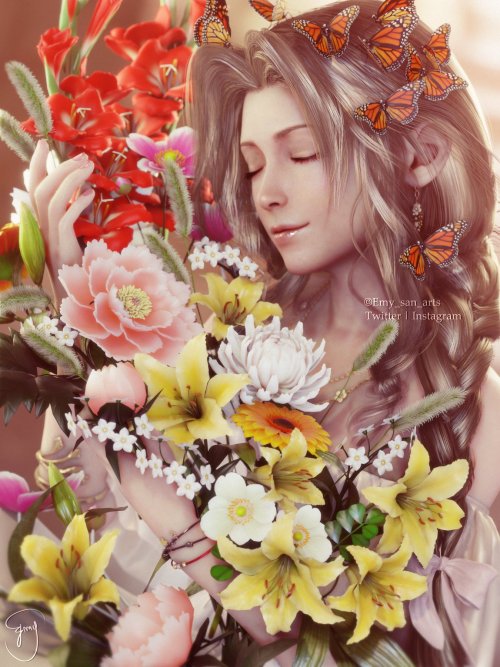
Hardcore FFVII fan sharing theories & fanart, sometimes silly stuff ⋆ AuDHD ⋆ She/her ⋆ INTP ⋆ Atheist ⋆ Non-native English speaker, be merciful with my odd way of writing ⋆ Twitter @TerraFatalis
234 posts
Latest Posts by terra-fatalis - Page 4
FFVII Remake Easter eggs and compilation continuity - Part 1: BEFORE CRISIS

AVALANCHE!
In Chapter 4, a group of Avalanche members helps Cloud, Wedge and Biggs to fight against some Shinra troops. The design of their uniforms is the same of the BC Avalanche group.

ATTEMPT ON THE PRESIDENT
During Chapter 1, while Heidegger and President Shinra observe the attack to Reactor 1, Heidegger mentions an assassination attempt on the President. He might be referring to the episode that took place on 30th February (yes, 30) 0001 in Junon.
“These sewer rats appear to call themselves Avalanche, sir. We are currently investigating whether they belong to the same group that made the attempt on your life.”

LEAVING MIDGAR
In Chapter 8 Aerith tells Cloud she once tried to leave Midgar. This happened in BC, on 9th August 0002, but Avalanche tried to kidnap her before she could leave the slums.
“You know, I thought about leaving once... But...in the end, I couldn't.”

TIFA’S CAT
One of the side quests in Sector 7 includes the research of three cats. They’re white with a pink collar, like the cat Tifa had when she lived in Nibelheim.

HIDEOUT IN WUTAI
After blaming Avalanche for the tragedy in Sector 7, Shinra divulged rumors about their allegiance with Wutai. It was showed in BC that Avalanche established there their HQ since it was the only remaining anti-Shinra country of the world.
“The sky is falling and Avalanche is to blame! But wait! Did you know Wutai is the one funding their activities!? For all their claims about fighting for the slums...they're nothing more than pawns of Wutai”
This alliance is confirmed in Intermission with Yuffie and Sonon cooperating with Avalanche to infiltrate Shinra.
Sonon: Gotta admit, I'm surprised you agreed to work with us.
Nayo: We're just doing what we think is necessary...to build a brighter future. That's all there is to it.

RUFUS
It was established in Before Crisis that Rufus conspired against his father providing intel and financial support to Avalanche. In Itermission, when Zhijie was questioned by the Shinra guards, he made fun of them but actually said the truth when he confessed the informant was Rufus.
Officer: Now spill it! Who gave you that information!?
Zhijie: Oh, his name was something like...Heidegger? (...) Alright, alright, I'll tell you. It was Rufus. (...)...Or was it Hojo?
Moreover Scarlet started suspecting of the presence of a mole in Shinra, since Wutai knew about their secret military projects.
Yuffie: That's enough, Sonon. I got this. Alright, lady, out with it. Tell us where you're hiding the new materia. Don't play dumb now. We know you've been cooking up something super-powerful.
Scarlet: Well, well... Wutai must have some highly skilled intelligence operatives. That...or we have a mole in our midst.

ALLIANCE
It is shown since Chapter 16 that there’s a particoular link between Rufus and the Turks. Indeed in BC Tseng, Reno and Rude were sentenced to death by President but Rufus saved them in exchange for their loyalty.
“The VP needs us.”

FINAL BOSS
The Whisper Harbinger appearing in Chapter 18 bears similarities with Zirconiade:
- They both have to be faced at the end of the highway after entering a flashing portal

- The shape of the body of the Harbinger (just like Whispers Rubrum, Viridis and Croceo) shares some similarities with Zirconiade

- Both battles take place in an alternate dimension with shattered environment

- After their defeat they emit energy blasts and explode with a shockwave

- After the explosion, sparkling particles fall slowly from the sky, like snow

-
For the other parts refer to the masterpost
Is Sonon really dead?
Yuffie’s mission in Midgar ended unsuccessfully. Shinra destroyed the base of her allies in Sector 7, she couldn’t get hold of the Ultimate Materia and, most importantly, Sonon died in order to save her.
His death gives a sense of closure to this newly introduced character. Although being quite short, the DLC is full of clever parallels between Yuffie and Melphie, Sonon's younger sister who got killed in front of his eyes during the Wutai war. He failed to save Melphie back then, but he can save Yuffie now.
But the big question is: is Sonon really dead?
The OST playing during the death scene is Seeing Melphie again. After getting stabbed, he has a vision of his little sister (a very touching moment tied to FFVII theme of reunion in the afterlife) accompanied by a bitterweet piano melody, that gets always softer until his last breath. But just when Nero seems to finish Sonon off, instead of mercilessly swallowing him into the darkness, he gently picks him up while the music digresses in an ominious and mysterious tone, hinting that his role may be not over yet.

But what could Nero want from Sonon?
I think the answer may be deduced diggin a bit into Dirge of Cerberus lore.
There's a not very well known entry related to the main DoC game (especially by the western audience since it had been released only in Japan and for a very short period of time): Dirge of Cerberus Multiplayer on-line. While some of the missions were later included in the international release of DoC, the plot of this game got lost despite its importance for the full understanding of the Deepground dynamics.
Here is a link for an excellent article from thelifestream.net that tries to keep a record of this expired entry, and here's a playlist of cutscenes from the game with English subtitles that helps understanding the main plot (btw, a great YT channel where you can also find localized playthroughs of rarities like DoC Lost Episode and Before Crisis).
A quick summary about Deepground and the Multiplayer game.
Deepground is a top secret facility created by President Shinra and located beneath the slums (remember that underground lab where Cloud, Barret and Tifa went to save Wedge? That's Deepground) where troopers and SOLDIERs - but also unaware civilians - endure severe experimentations that push their bodies and minds to the limit, aiming to create ruthless SOLDIERs with no moral boundaries. The elite DG SOLDIERs are known as Tsviets, like Weiss, Nero, Argento, Shelke, Rosso and Azul. To avoid any rebellion each candidate and Tsviet has a restriction chip implanted in their brain controlled by four Restrictors loyal to President Shinra. This mechanism is particoularly useful to control those Tsviets who don't make a distinction between allies and enemies.
Because of this the Tsviets started to secretly plot against Shinra until they finally understood how to cheat the system. Shelke and Argento found a way to implant a non-working chip in a candidate, so that they could kill the Restrictors. The protagonist of DoC Multiplayer is indeed this candidate (gender and name chosen by the player). Thanks to her special abilities Shelke tricked the candidate into seeing a supporting partner, Usher, who helped them into ranking as a Tsviet, and most importantly she instilled the hatred towards the Restrictors giving to the candidate false memories of a little sister brutally killed by one of them. In the end the candidate managed to kill one of the Restrictors but got stabbed as well. This is the final dialogue of the game:
Weiss: Can this one still be of any use?
Shelke: Negative. The prolonged SND [Synaptic Net Dive] has rendered most of the brain inaccessible. It's only a matter of time before it breaks down completely.
Rosso: Really? After all that hard work. What a shame.
Weiss: Then hurry up and find a suitable replacement. After all no one knows what the Restrictors really look like.
Azul: So we have to find another one? This is becoming frustrating.
Weiss: It can't be helped. Only one out of hundreds can make it this far.
Rosso: Ordinary humans simply aren't as strong as we are.
Weiss: Precisely.
Shelke: Well, it's actually quite simple. With the help of the HJ Virus I am able to hack into Patricia [computer system] and bypass security. Then all that's needed is to pick a suitable subject before it's implanted with the chip.
Weiss: Shelke, find a new one quickly.
The devs had never provided any time reference for the Multiplayer story but now, with Intergrade, we know for sure that the Tsviets are still under Shinra's control when Yuffie and Sonon met Nero on December 12, and, while the President will be killed the next night, it seems clear that Scarlet is the one who will take full control of Deepground until her defeat the next month.
Conclusion
My theory is that Sonon could be the perfect person to replace the Tsviet-candidate and the dead Restrictor, so that Weiss and the gang can pursure their plan of rebellion gainst Shinra:
Unlike many soldiers Sonon has proved to be an extremely strong and capable fighter standing up to Nero.
He has the right motivation as he seeks revenge against Shinra - especially Scarlet - for the death of his younger sister, which Shelke could further manipulate.
Unlike any other Deepground candidate, he has no working restriction chip implanted.
Sure, one could argue that Nero severely wounded him, but the game clearly reminded us before the battle that Nero can easily disintegrate the bodies of his victims, while he reserves a different treatment to this particoular character. And, by the way, this wouldn't even be the first time a Tsviet pretends to kill someone as Shelke did the same with the Tsviet-candidate. As far as I know the main DoC game never explained how the Tsviets overpowered the remaining Restrictors, who replaced the Tsviet-candidate or what happened to Argento - who isn't part of the DoC cast. Sonon might be the missing piece of this sub-plot that may lead to new secondary arcs that could tie a bit more Deepground to the main FFVII story.
The care for details..



The Crab Warden stored in the corkscrew tunnel is the same weapon that killed Melphie during the Wutai war.
This is one of the sweetest and most heartwarming details of the whole game.
Barret wears a necklace with two tags, his and Marlene's and, thanks to the mods, now we can finally see what's written on Marlene's:
"I love you more than anything"
🥰❤️


Source!

Tanabata 七夕 is a popular traditional Japanese festival of Chinese origins. This celebration commemorates the legend of Orihime and Hikoboshi (symbolized by the stars Vega and Altair respectively), lovers separated by the Milky Way who were only allowed to meet once every year, the Seventh night of the Seventh month.
People celebrate Tanabata expressing wishes to the stars - written on small pieces of paper hung on bamboo, often concerning their love life due to the romantic origins of the legend. Tanabata is also called Star festival or Night of the loving stars (and, in China, Chinese Valentine’s day or Night of sevens).
I think it’s easy to find some nice paralles with FFVII: the focus on the stars (星, that in FFVII universe is used to identify both the stars and the Planet) and number seven, wishes to the stars, separated lovers..? In can make the happiness of every shipper. But there’s one more cute detail.
Until the second half of the XIX century Japanese people used the Wareki calendar, based on lunar phases, so the 7th day of the 7th month is a variable date that usually falls on the firts half of August.
August 11, 1986 - Cloud’s birthday - was indeed Tanabata day in real life! (The date may vary between 11th and 12th but that depends on the time zone). It might be just a coincidence, but I love it a lot anyway! It surely is my new headcanon! ❤️






Requested by @paarsetulpen
Part 3: Another Bombing [A Complete Analysis of Final Fantasy VII]

Welcome to the third chapter of my FF7 analysis. I am writing these posts as one long rumination under the assumption that you have read the prior chapters. If you are new here (thanks for coming!), please head to the following masterlink before proceeding further: https://hartmonkey.tumblr.com/post/674955243020238848/a-complete-analysis-of-final-fantasy-vii
Last chapter we briefly noted Cloud, Tifa and Barret’s train trip to Mako Reactor 5. This chapter will take a deep look into their individual motivations and personalities as revealed throughout the mission. Before examining this venture, let’s backtrack just a little to an often overlooked moment. I’d left it out last chapter for it feeds into the combat system we are about to embrace – a system that is in every way married to FF7’s lore (the external worldbuilding) and arcs pertaining to individual characters. This moment is where Barret asks Cloud to give the tutorial on using Materia.
Continua a leggere
Info (in case anybody cared...)
I’ll soon delete my other account https://stargazerobservatory.tumblr.com/ . It’s another FFVII blog that was meant to include only lore-related posts, while this one was dedicated to my fangirling rants lol. Since I haven’t used that account for a long time and I’m actually posting much more stuff here, I’ll regroup/reblog/rewrite the posts I have there under a single account.
Zack’s Last Stand
Find the differences!
CRISIS CORE vs FF7R comparison
I’m not good with Japanese, but these lines sound VERY similar!
It would be interesting to know if there are others, did you spot any?
FFVII Remake vs Crisis Core comparison
A question about Kingdom Hearts, but can be for other stuff too. Do you think some important context or subtext is lost in the translation process from Japanese to a second language, even if it's translated to the best of a translator's ability, and if so, do you prefer a more literal translation over an official dub?
Hello! Thanks for the ask.
To answer the first question, there's different points to be made given the case by case nature of the topic. Important or simply interesting (these are not the same thing) information absolutely can be lost in the process of translation, but there's a lot of things fans need to understand:
Per discussion, is it actually lost, whether in the specific line or that of the overall context elsewhere?
Is the meaning actually *important* or imperative for understanding context [subtext]?
If lost, is it something that could've been localized creatively within the limitations of its presentation (voice acting/lip-sync, text space, etc.)?
Was it something that couldn't even be translated literally within the corresponding localized language? And/or did it not naturally flow into the writing of the actual scene itself for the given language?
Keep in mind that some interesting nuances built within a language system is really tailored for THAT language, and doesn't have to (or can't be) be transferred to another language smoothly in the production process of localization—if it's actually important, they might have to find a way, and chances are a literal translation may not even be enough to accomplish this. So to the second question—it isn't really “literal” vs localization for me, because whether one or both of these things can get the job done is circumstantial. Ultimately, what I care about most is whether what is written makes sense and can still be seen to retain what matters contextually (and sometimes, this means you can even get MORE or something more direct from a localization as opposed to “literal”). I’m using “ “ because really, you don’t want literal, for the majority of the text, it just doesn’t work that way as smoothly as people think. But I understand sometimes literal is actually “close to definition as possible” for people. (sometimes, indeed)
Anyway, if there is an issue with what's written, I know a "literal" translation doesn't always solve the inherent factors dependent upon the specific nature of the JPN language. The "literal" definition doesn't always fully capture how the Kanji is contextually used in the writing for another language. If I ever felt something was completely missed within a localization, my instinct is to first check the nature of the JPN and how it's written contextually to see how it fairs.
Of course, if it's information that isn't really based on the nature of the Kanji and how it's used, that it's something just being misunderstood in translation, then that isn't even a matter of whether it was literal or not—it was just wrong, and could've been right in any form if the text was understood (meaning, I'd take it literal or localized as long as the information is correct). In comparison to the amount of important storytelling text actually localized in video game projects, this doesn't nearly happen that often, though.
To look at Kingdom Hearts:
There have been many, many examples, especially between #1 and #2 discussed within fandom over the last 20 years. lol The majority is very miniscule and inconsequential (if even non-existent of a difference with proper understanding)—in KH3 I tend to think of some scenes between Sora and Kairi that has been discussed. @phoenix-downer has some excellent JPN/ENG comparisons of Sora and Kairi's Paopu Fruit and Light in the Darkness scenes (plus more) that serve some examples—Phoenix might be more readily able to remember some things over the years than I. There’s also this line from Xemnas about finding the Ancient Keybladers in KH3—this one can reasonably create a misunderstanding, but at the same time we don’t exactly have all the information at this point in time anyway.
One thing I do tend to think of is the scene between Aqua/Terra/Ven and the Disney Passes—where the term hogosha 保護者 (guardian, protector, patron, parent) is used in JPN, while in ENG it was written as "grown ups". There's a subtext here that has been missed by some ENG speakers. Similar to #4 (about literal translations), this is one of those cases where contextually speaking, the ENG went with what made sense for the scene and all factors corresponding to it, while still retaining something similar to the concept context-wise. As you can see based on the definition, the term hogosha is very flexible in use due to its span of multiple different words, but in its usage, it always has the connotation of something "parental". But, translating it as straight up "parent(s)" doesn't always work because of the nuances of the word. e.g. From FFXIII, Lightning is a hogosha to Serah, but this isn't to say that Lightning is literally her parent/mom—the contextual nature of hogosha tells more than this but with the same connotation. Sometimes it can be directly "parents/legal guardians", like how it's used to refer to what is essentially PTA school meetings (hogoshakai 保護者会). There's a reason why hogosha is distinct from just more direct words for parent (like oya 親 or ryoushin 両親).
This flexible nuance isn't readily and neatly packaged in a single word in ENG, however, and while, say, “guardian” [parental] can fit in some situations on its own, the connotation of parental isn’t so readily available like it is for hogosha alone. (A good example is this post I made) So, contextually there are other ways to capture it, and that may have to be with a non-literal translation. But, its meaning was missed by some ENG speaking fans, so when they hear "Aqua and Terra are like parents to Ven", they have no idea where that's coming from. Of course, some people were able to understand how this is carried contextually by the word "grown ups" and the situation of the Disney Passes—otherwise, some people completely missed that parental nuance, which would be significant of representing the relationship between Aqua/Terra to Ven.
Sometimes it isn't a localization issue, but a perception one.
With that being said, if in the case of other fandoms/series? It's all over the place. I've seen it all, between something being lost (important or just interesting [unimportant]), something being a mistranslation, or something being retained and people are honestly just trippin' because of misunderstanding things. Straight up. #4 (literal translation/context issues) happens a lot, in that case.
For example, recently I made this post and a follow up post about functionalities of JPN pronouns for (I, me) and the differences that lay there—there's also an extra layer I think I didn't include, which is that between using a specific pronoun in the form of hiragana/kanji/katakana, sometimes it's a stylistic choice as well. (Don't worry about this if you're confused lol). Point is, in this situation I also talked about how this was something that only applies for the JPN language and not necessarily others (especially ENG).
But again, a lot of this is case by case and we'd have to consider the #1-4 above, and for me, I know that to get the job done, it doesn't even have to be literal in order for this to happen.
As an extra note, fans REALLY need to understand localization, if even for SE specifically, to really talk about it efficiently. A lot don’t, and don’t care to. There is a sea of information to gather to form a perspective, and if they had this information, it’d change what they think about the “changes” a localization will make. One of the most blunt translators I can think of (Tom Slattery) gave this thought towards this very topic, and it’s just the tip of the iceberg. So I’ll leave it with this:
Vocal fans on the internet often complain about translators "changing" things in the English versions of games. This always amuses me, as we're very often working alongside the team to help name those things in the first place. For example, on Final Fantasy XIII, we were asked to help with the naming of the roles--Medic, Synergist, Ravager, and so on. We were intending to use different names in Japan and the US/EU from the start, and we (the English translators) brainstormed and proposed both sets. For the Japanese version, they needed English words that (A) sounded cool when rendered into Japanese, and (B) would be understood by non-English-speaking Japanese players, so we worked with the writers to come up with a set of consistent-sounding terms that met those criteria. For the localized version, our focus was on creating names that would have a more sci-fi feel to a native speaker's ear, and also abbreviate to three letters in a way that looked natural and made the short forms quickly and easily distinguishable from one another. We didn't "change" anything; we just generated two different sets of names for two different audiences.
Retroactive integration of the English translation into the Japanese version happens on projects quite often as well. For example, we were asked to come up with a translation for the names of the transporters in the Nautilus theme park. The Japanese name at the time was not something that really worked for us, so we went with "Nautilift." A few weeks later, that started popping up in the Japanese script. That kind of thing is always a huge compliment. It's a collaborative process. No one is going out stomping all over each other's work just for the heck of it.
FFVII AFFECTION MECHANICS LIST
Probably this article was better suited for Valentine's day but I'm not well known for my perfect timing... :)
I thought it could be useful to have a full list of the OG variables that affect the date mechanics, a description of the actual Remake mechanics and the differences between the two games all in one post.
I had initially planned to add here also the Wall Market dress mechanics but this post is long enough and the Remake dresses are just so amazing that they absolutely deserve their own post and my complete devotion💖
So...Let’s get to the list!
OG AFFECTION POINTS
A reminder before reading:
Not all the optional choices of the game affect the scores.
Not all the optional choices that affect the score are mandatory.
Only four characters are associated to the affection mechanics and they start the game with different pre-set scores: Aerith 50, Tifa 30, Yuffie 10*, Barret 0. Aerith and Tifa are the most probable outcomes for the date.
The two main events influenced by the affection points are the Gold Saucer date and the scene under the Highwind. The charcter who has the highest score will spend a night with Cloud at the Gold Saucer; the dialogue between Cloud and Tifa before the final battle will be more explicitly romantic if Tifa has at least 50 points.
The characters are not in competition with each others, most of the choices affect the points of just one character at a time and sometimes they even affect uniformly more than a character. As a general rule, the points increase when Cloud tries to be a kind person and decrease when he's willfully mean.
The outcomes for the date and the HW scene can be different: it's not necessary to achieve Tifa's date to get the high affection HW scene, nor dating Aerith automatically triggers the low affection version. It is perfectly possible to get both Aerith's date and the high affection scene with Tifa.
MIDGAR:
1. On the train after the attack at the Reactor No. 1, when Jessie tells Cloud about the IDs:
Jessie: I know! Next time, I'll give you one I made myself.
"Thanks anyway" (No change)
"Looking forward to it" (-3 Tifa)
2. [Optional] At 7th Heaven, if Cloud bought Aerith's flower:
Tifa: But...A flower for me? Oh Cloud, you shouldn't have... - Cloud: No big.
"Give it to Tifa" (+5 Tifa)
"Give it to Marlene" (+5 Barret)
3. [Optional] If Cloud talks to Tifa when she's behind the bar:
Tifa: Sit down. How about......something to drink?
"I don't feel like it" (No change)
"Give me something hard" (+5 Tifa)
4. When Cloud tries to leave Seventh Heaven:
Tifa: So! You're really leaving !? You're just going to walk right out ignoring your childhood friend !? - Cloud: What......?
"How can you say that!" (+5 Tifa)
"...Sorry" (No change)
5. [Optional] The morning of the attack on the No. 5 Reactor:
Tifa: Good Morning! Cloud! Did you sleep well?
"Next to you, who wouldn't?" (+5 Tifa)
"Barret's snoring kept me up..." (+5 Barret)
6. On the way to the Reactor 5, getting through the train without being caught by the security system
Succeed (+5 Tifa, +5 Barret)
Fail (No change)
7. When Cloud is hanging after the explosion of the Airbuster in the Reactor 5:
Barret: Hey, you gonna be awright?
"(Be strong)" (+2 Barret)
"(I don't know if I can hold on)" (-3 Barret, +1 Tifa)
8. After falling in Aerith's church, when the girl is trying to run away from Reno:
Push a wrong barrel (-3 Aerith)
Tell her to fight the troopers (-1 Aerith)
Tell her to run (No change)
Tell her to run, but she has to fight (-1 Aerith)
Push the right barrel (+1 Aerith)
9. At Aerith's house, when Cloud says he wants to go back to Sector 7:
"No way!" (+1 Aerith)
Aerith: Is Tifa......a girl? - Cloud: Yeah. - Aerith: A girl...friend? - Cloud: Girlfriend?
"Yeah, that's right" (-5 Aerith)
10. When Cloud and Aerith are going to split up after getting to Sector 7 gate:
Cloud: Thanks. I guess this is goodbye. You gonna be all right going home? Aerith: Oh no! 'What ever will I do!?' ...isn't that what you want me to say?
"See her home." (No change)
"Go on to Sector 7" (+1 Aerith)
11a. [Wall Market option A] Talking to Aerith if Tifa is chosen as Don Corneo's bride
"You alright?" (+3 Aerith)
"We gotta help Tifa!" (-2 Aerith)
11b. [Wall Market option B] Talking to Tifa if Aerith is chosen as Don Corneo's bride
"You alright?" (-2 Tifa)
"We gotta help Aerith!" (+3 Tifa)
11c. [Optional] [Wall Market option C] If Cloud is chosen as Don Corneo's bride and acts hesitant
Don Corneo: You don't like me? There...there isn't someone else, is there?
No, only you (No change)
Yes, his name's Barret... (+5 Barret)
12. When Corneo throws the group in the sewer:
Talk to Aerith first (+3 Aerith)
Talk to Tifa first (+3 Tifa)
13. [Optional] After the plate fall, if Cloud talks to Marlene at Aerith's house:
Marlene: Guess what? Guess what? Aerith was asking me lots of questions. Like what kind of person Cloud is. I bet she likes you, Cloud!
"I don't know" (+3 Tifa, -3 Aerith)
"Let's hope so" (-3 Tifa, +3 Aerith)
14. At Shinra HQ, after meeting Red XIII and before fighting Sample H0512:
Cloud: We'll take care of that monster. Somebody take Aerith somewhere safe...
"Tifa, I'm countin' on you!" (-2 Tifa)
"Barret, take care of her!" (+2 Barret)
15. When party splits up to escape Shinra HQ:
Cloud: If all five of us go together, we'll be noticed. Let's break up in two groups.
Whoever is in the party gets a +2 boost
16. [Optional] Talking to Tifa in the jail (this option can be repeated indefinitely):
Tifa: Psst (Can we get out?)
"Leave it to me" (+1 Tifa)
"Kinda hard" (-1 Tifa)
17. In the jail, when Cloud thinks about the other party members:
I wonder how [Barret/Aerith/Red XIII] is doing
The first one gets a +3 boost (no change for Red XIII)
The second one gets a +1 boost (no change for Red XIII)
No change for the last one
18. After leaving Midgar:
Barret: ^#$^%......awright. Go Northeast to a town called Kalm. If something happens, we'll meet up there. 'Sides, we can't have 5 people strolling down the fields. It's too dangerous. Split us into 2 parties...
Whoever is chosen to join the party gets a +1 boost (no change for Red XIII)
KALM
19. After Cloud's flashback when Barret decides to leave the Inn:
Barret: Yo, Cloud! Let's get a move on!
"Right" (+1 Barret)
"Wait a sec" (Barret talks again) -> "Beautiful, just beautiful" (+3 Barret)
"Wait a sec" (Barret talks again) -> "Is that all?" (-1 Barret)
20. [Optional] If talking to the woman on the first floor of the house next to the Inn (the points change only if the characters are in the party. The dialogue can happen at any time before the GS dates):
Thanks to Mako energy, life's pretty darn convenient. Thanks to Shinra. Don't you think?
"Yeah, maybe" (-2 Barret, -1 Aerith, -1 Tifa, +1 Yuffie)
"You're full of it" (+2 Barret, +1 Aerith, +1 Tifa, -1 Yuffie)
21. [Optional] If talking to the woman on the second floor of the house next to the Inn (the points change only if the characters are in the party. The dialogue can happen at any time before the GS dates):
Mako energy's made things a lot more convenient......But seems like a lot of plants and animals have been disappearing at a rapid pace. I think the old life was better. Don't you think so?
"Yeah, maybe" (+2 Barret, +1 Aerith, +1 Tifa, -1 Yuffie)
"No way" (-2 Barret, -1 Aerith, -1 Tifa, +1 Yuffie)
FORT CONDOR
22. [Optional] If Cloud is the party leader and talks to the old guy (the choices affect everyone, even if the party hasn't recruited Yuffie yet):
It appears you have a problem with Shinra, too. After all, you climbed up here. Why not listen to what I have to say for a moment?
"I guess so" (+5 Barret, +3 Aerith, +3 Tifa, +2 Yuffie)
"Not interested" (-5 Barret, -3 Aerith, -3 Tifa, -1 Yuffie)
23. [Optional] After the old guy tells Cloud about his problem (the choices affect everyone, even if the party hasn't recruited Yuffie yet):
What do you think? You want to join us in our fight?
"All right" (+5 Barret, +3 Aerith, +3 Tifa, +2 Yuffie)
"Not interested" (-5 Barret, -3 Aerith, -3 Tifa, -1 Yuffie)
*MEETING YUFFIE
[Optional] The player can repeat the recruiting dialogue as many times as they want. Recruiting Yuffie on the first try will grant her 10 points, failing and repeating it will increase her points up to a max of 30 points (+2 for every correct answer).
CARGO SHIP
24. [Optional] Talking to Yuffie who asks for Tranquillizers for her motion sickness:
"Here, use this" (+4 Yuffie)
"Nope" (-2 Yuffie)
25. Talking to Aerith about the Highwind:
Aerith: That was REALLY something. Hey, do you think I could get on it?
"I'll take you someday" (+2 Aerith)
"I dunno..." (-2 Aerith)
26. Talking to Tifa about the war:
Tifa: ...But, you know what? I really hate this uniform. Uniforms, soldiers, war, I hate 'em all. They take away all the things and people you love... I wish they'd all disappear. Right, Cloud?
"Yeah..." (+2 Tifa)
"I don't know" (-2 Tifa)
GOLD SAUCER
27. After Barret leaves the group, Cloud can choose a partner. The choice will affect the score of the FIRST character he'll interact with. Only if the player declines Red XIII they'll still be able to affect one of the girls' score. If the player doesn't pick anybody, the character with the highest score will join him and the points won't be affected (Red XIII will join instead of Barret):
Go together (+3)
Don't go together (-2)
COREL PRISON
28. The character chosen to accompany Cloud and Barret to fight Dyne:
Cloud: So there it is, Barret. So I guess it'll be Barret, me, and......
(+10 Aerith, +3 Tifa, +2 Yuffie, no change Red XIII)
GONGAGA
29. [Optional] After meeting Zack's parents:
Cloud can talk to Tifa and/or Aerith (if they are in the party).
Ignore them (-3 Aerith / -3 Tifa)
Talk with Tifa (+1 Tifa)
Talk with Aerith -> "Poor guy" (+1 Aerith)
Talk with Aerith -> "(...jealous...envious...)" (+2 Aerith)
COSMO CANYON
30. [Optional] During the first visit the party splits up. If Barret was in the party Cloud can have a conversation with him:
Barret: There was this guy who studied 'Planetary Life' here. He couldn't take things the way they were, so he went to Midgar to form AVALANCHE. Wanna hear more?
Not really (no change)
"Go on" (additional dialogue) -> "And then" (Barret +6)
"Go on" (additional dialogue) -> "Yeah, whatever..." (Barret +3)
WUTAI
31. [Optional] Completing the first quest in Wutai until Yuffie returns the stolen Materia (Yuffie +10)
***
REMAKE AFFECTION POINTS
Even though the Remake covers just the Midgar section, the developers payed homage to the Gold Saucer dates including a beautiful "Resolution scene" at the beginning of Chapter 14, where Aerith, Tifa or Barret will appear and talk to Cloud.
What determines the optional cutscene this time is the number of side quests completed during Chapter 3 and Chapter 8, namely the two chapters spent building up Cloud's merc reputation with Tifa and with Aerith.
The Remake affection mechanics are very simple:
Aerith and Tifa start as equals.
The player can complete 6 Odd Jobs and 1 final Discovery Quest, each one granting to the related girl +2 points.
The girl Cloud will interact first after landing in the sewers will gain an additional +1 point that will eventually serve as tiebreaker.
As you can guess, the girl with the highest score will lead the optional cutscene but if both girls have less than 5 points then Barret's scene will be unlocked.
PERSONAL THOUGHTS:
The Remake affection mechanics are significantly different from those of the OG. Funnily enough some free-answer dialogues still exist, however not only they don't affect the score but they're also illusory choices as the plot is very linear (see below).
The Remake mechanics are less romance-based. Sure, accomplishing the side quests can be seen as Cloud spending valuable time with the girls, anyway they spend the day doing rough and mundane activities like defeat monsters, rescue kids and search for cats. The focus will always be to improve Cloud's reputation as a reliable merc. Moreover, it doesn’t really make sense to consider Barret as being positively impressed by Cloud refusing to help people in need.
While in the original Cloud can have just one date and one of the two versions of the Highwind scene, the Resolution scenes are not mutually exclusive and it's perfectly possible that all of them take place during the same night.
***
OG AND REMAKE COMPARISON
Most of the situations linked to the affection points in the OG changed or were left out from the Remake. In general Remake-Cloud tends to be kind with both Aerith and Tifa and by the end of the game his relationship with Barret improves as well.






Part 1: Enter, Ex-SOLDIER! [A Complete Analysis of Final Fantasy VII]
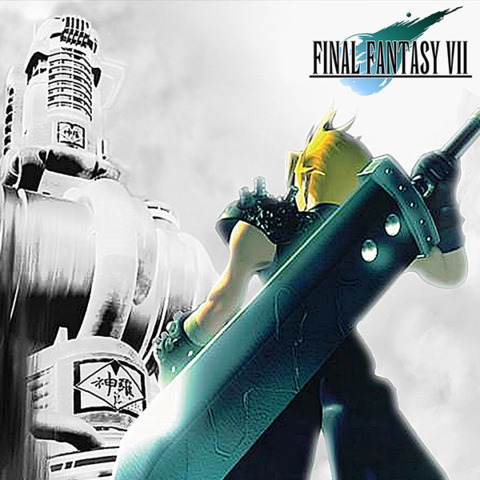
Masterlink: https://hartmonkey.tumblr.com/post/674955243020238848/a-complete-analysis-of-final-fantasy-vii
This is the first post in my chapter-by-chapter analysis of the entire Final Fantasy VII. Each chapter will be primarily based on the 1997 game, with discussion of the Remake and other entries in the compilation where relevant (ie. when they pertain to the original story). Aside from a spoiler-warning for the entire FF7 (this is the only warning I’ll give on that regard), I want to note a few things before we start.
Keep reading
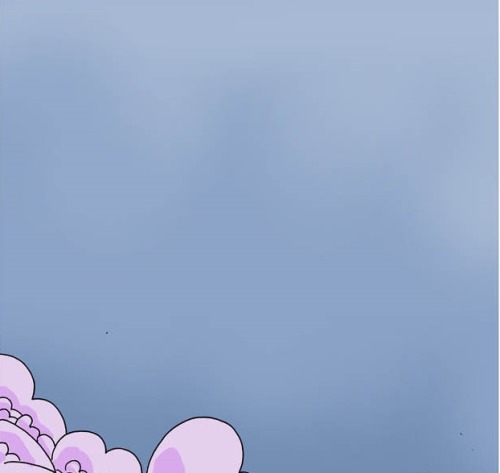









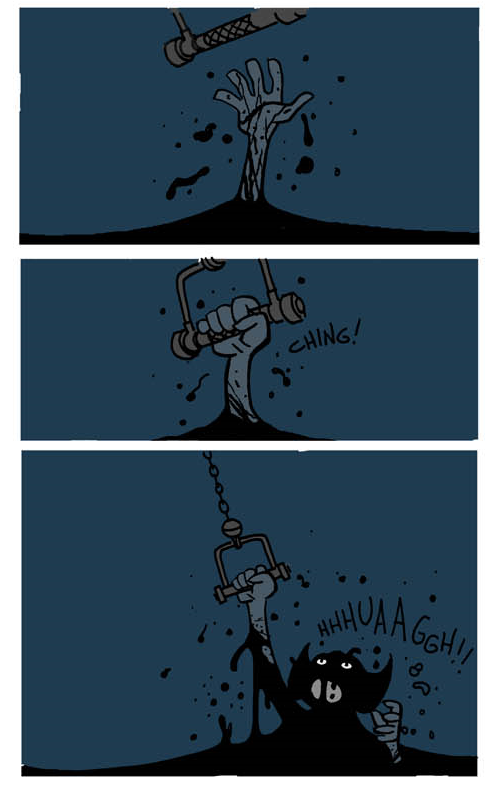
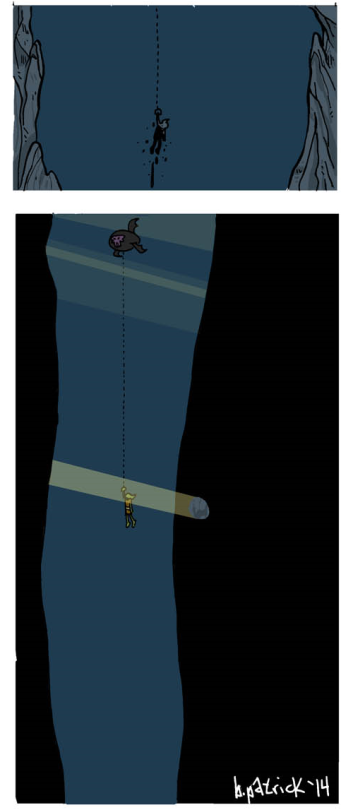
Different Stories Resonate with Different People
Happy 25th anniversary Final Fantasy VII ❤️
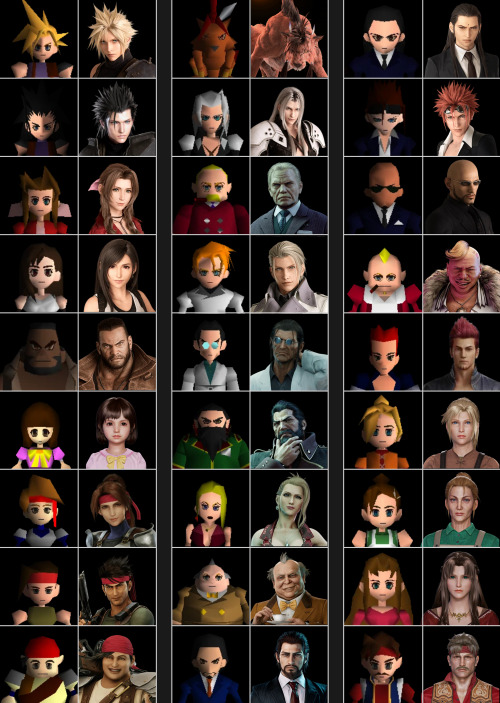
Graphics enhancement, 23 years later!
hi there but can you describe to what this is suppose to mean (In the RPG text, there was a method to make it easier to understand who's line by using "I", "I", "I" etc. for each character, but "There was a notational fluctuation, so I replaced it completely. There was something like "ta ~", long ago) - Kazushige Nojima. apparently people are taking Nojima's words here as saying the Eng localization and maybe the others as well for 7 remake as bad? is that really the case tho?
Yeah, I remember that. It's one of those moments I start to think that some people shouldn't comment on languages they don't know, and/or don't know how to navigate via translation/dictionaries—especially when this is combined with selfishly following their own agendas by skirting context. We know people do this. Happens all the time with source materials, or even epitexts like guidebooks or interviews. But, it's more annoying when it directly involves a writer's social media account within the drama. It's just really bad.
But let's contextualize.
Every now and then on his Twitter, when he isn't posting about his cute pets (lol), Nojima will post something related to video games/writing, and it'll also often be when you see a small part of the twitter FF7 ENG fanbase parading around his tweets with comments or likes. For instance, a tweet where he talked about leaving room for imagination and interpretation, or when talking about scenario writing. It's not necessarily a bad thing to have this interaction, though sometimes people will say weird things. You'll also find that his tweets like this usually get a good amount of attention as opposed to when he talks about his pets.
That's when we get to the tweet you're referring to, I'd reckon this being the most attention he's ever gotten for a personal tweet. Here's a decent translation, w/ some things added in w/ brackets for clarity:
RPGのテキストで、キャラごとに「ぼく」「僕」「ボク」などを使い分けることで誰の台詞か判りやすくする、なんて手法があったけど「表記ゆれがあったので僕に全置換しときました~」なんてのはわりとありました、昔。
In RPG texts, there was a technique of using different words for each character to make it easier to identify who is speaking, such as "I" [ぼく], "I" [僕], "I" [ボク], etc. However, a long time ago someone would say something like "there was inconsistency in the notation [orthographical variants], so I completely replaced them with I [僕]".
A couple of things.
At its core, this is just a comment about game development/writing. There is no "shade" (I really hate this immature perspective), there is no talk about localization. That was made up by people who don't know how to translate or navigate JPN text. What he's essentially talking about is: how there were different ways to write characters referring to themselves, but how in the past, this was averted and made consistently one way.
That's it.
As you can see, this absolutely has nothing to do with the Remake, and I would wager it also has nothing to do with the OG. This all hinges on the proposed reason for the technique—to make it easy to identify/understand whose dialogue is whose. For the Remake, this issue is nonexistent in today's age considering voice acting, and for the OG, the dialogue boxes identified who the speaker was anyway. Really, this also doesn't automatically apply to all localizations, especially ENG, because of the way the corresponding languages work. Especially in ENG, there's not a lot of natural variances for someone just saying "I" in writing. The closest thing is something more akin to an attribute to characterization (as opposed to clarification of who is speaking), like a character referring to themselves in third person instead of "I", a godly character saying "this one" when referring to themselves, or a character egregiously saying something like "me thinks". For characterization purposes, something close in the OG would be how the 5 bosses of Pagoda had different methods of speaking, which the ENG didn't follow suit apparently.
While an issue of "JPN did this but ENG didn't" does apply to, say, that situation with the 5 bosses: one, you still need to think of the context of how certain things don't directly work for every language, and two, even the example Nojima brings up doesn't exactly apply the same way the examples I mentioned or the 5 bosses do.
Which in this case, Nojima brings up the example of different ways to write what would be pronounced as "Boku" (I, me)—the hiragana ぼく, the kanji 僕, and the katakana ボク versions of the exact same word. They would be the "orthographical variants" [表記ゆれ]—and I was very tempted to translate it as the following meaning—which is simply referring to "words with the same pronunciation and meaning, but different written forms". I wrote "inconsistency in the notation" to signify how this was a situation where someone saw these orthographical variants (or fluctuations, as some translated) and wanted to change them to one, consistent thing. This....is really just a notation thing. Kana is for pronunciation + writing sake, all three of these aren't completely different words. This is different than the 5 bosses example, as the Lifestream user mentions 私 (watashi), ワシ (washi), オラ (ora), and わらわ (warawa)—those are actually all legitimately different words + pronunciations AND mean "I, me". Much more appropriate and often done in JPN fiction.
Nojima's example of 僕/ぼく/ボク ( all "Boku") is not the same, and honestly, it absolutely makes a lot of sense why someone would look at that and think....why? When the 5 bosses example would be the better approach instead imo.
Anyway, the problem with people who misunderstand this is that they're wanting to take this scenario and create a narrative that Nojima is mentioning this specific instance, that isn't even relevant for the Remake, as a means to talk bad about his fellow development team members and reference other "issues" in the Remake's localization. Hell, even look at the comments, which are all from JPN speakers, one of which is someone else who works at SE. None of which are talking about the Remake or all localizations (which literally....why would JPN speakers be doing this???)—just writing for games in general. I’m assuming this tweet gained such massive traction because of how most things ever do, but it isn’t some conspiracy in the making where he talks bad about his fellow employees.
And the funny thing is that, it absolutely can and does apply to the development for even just the JPN version, as this would happen even at the stages of which editing, proofreading, and programming these texts into the game—now, this CAN also apply at the stages of localization, but in addition to what otherwise is also for the JPN. Nojima could vary well be referring to something that happened when making the JPN version of a game long ago, NOT any of its localizations. That isn't made clear.
What is clear, however, is that Nojima isn't talking about Remake or even directly localization. This is just people reaching for their own twisted purposes, and as always, it's annoying.
It’s just about pronunciation.
It’s just fandom being fandom. Insubordinate. And churlish.
Easter eggs at Seventh Heaven
OG Seventh Heaven and AC Barret, Marlene and Red XIII

AC Seventh Heaven

Remake concept art of the bar

Original Seventh Heaven

Tifa’s interrogation: the flashback at Kalm
The flashback at Kalm represents the first time Tifa truly comprehends the depth of Cloud’s delusions. Some fans see Tifa’s behavior during this episode as complete head-in-the-sand avoidance of the issue.
But… this is a misinterpretation. Tifa isn’t avoiding Cloud’s crisis at Kalm, even if she does opt for subtlety (a necessity, given what transpired at the train station). Tifa tries to use the Kalm flashback to gather evidence to disprove Cloud’s version of events… but she unfortunately discovers that the situation is not so clear-cut.
Tifa’s behavior makes her intentions obvious. As soon as Barret asks Cloud to tell his story, Tifa keeps silent, fidgeting restlessly with her hair. And in contrast with Barret and Aerith, her only dialogue is “…”s:

As we know, Tifa hasn’t yet had the chance to hear Cloud’s side of the story: at the train station, he reacted violently when Tifa questioned him; at both the bar in OG and Remake’s Alone at Last, Cloud brushes off her questions. Kalm marks Tifa’s very first opportunity to gather information and understand the nature of Cloud’s inconsistencies. The fidgeting is a sign of Tifa’s anticipation/dread; the ellipses represent her listening intently to Cloud’s story, giving him the space he needs to speak without her contradictory recollections setting him off.
Indeed, Tifa’s very first remark is only in response to an interruption:

Barret: Yo wait a minute!! Isn’t that, um…? The name of Sephiroth’s mother… I remember Jenova. That’s that damn headless spook livin’ in the Shinra building.
Cloud: That’s right.
Tifa: Barret, would you please let us hear what Cloud has to say? You can ask questions later.
Barret: Tifa, I was only…
Tifa: OK Cloud, continue.
Aerith: The childhood friends reunite!
Cloud: …I was really surprised with Tifa.
(watch here)
Tifa abruptly cuts Barret off in a way that takes all three characters aback–why is she so uncharacteristically brusque? Cloud, Barret, and Aerith all verbally react to the outburst, as the devs want the player to notice how unusual Tifa’s behavior is. While a first-time player may not understand her motivations, a seasoned player will: at this moment, Tifa doesn’t care about anything but hearing Cloud’s story and figuring out what’s wrong with him.
Tifa continues to listen in silence until Cloud reaches her house. Suddenly, Tifa asks Cloud about everything he did there:

Tifa: Cloud…? Did you go into my house?
Cloud…? Did you go into my room?
Did you play my piano?
(if you check in the drawers to find the underwear…) …Cloud. We’re talking about something really important here.
Did you read it? My letter?
Do you remember what it said…?
Cloud… Do you remember all of it?
(link to the full sequence in Tifa’s room)
These questions may look trivial, like a frivolous Tifa trying to ensure her girlish modesty was maintained five years ago. But it’s the last two questions about the letter which reveal what Tifa is truly doing: she’s subtly interrogating Cloud to determine if he was truly at Nibelheim. If Tifa’s primary motivation is to lessen her embarrassment, then why does she explicitly prompt Cloud to restate the entire letter in front of the entire team five years later?
The full content of the letter is information which Tifa is intimately familiar with, information that only she–or someone who truly was in her room that day–would know. If Cloud doesn’t know about the objects in her room or blatantly bullshits in response her questions, then Tifa has all the more evidence that Cloud wasn’t actually there. But if he does know the answers to these questions, especially regarding something as temporary as a letter, then… what does it mean? That Cloud truly was there, even though Tifa doesn’t remember him being there…? What does that say about Cloud’s memories…? What does that say about Tifa’s…?

The fact that Cloud passes her “test”–that he knows private details of her room, and gives an accurate account of its contents–leads Tifa to recognize that there is more to Nibelheim incident than just her recollections, and there is more to Cloud’s side of the story. Tifa doesn’t have a full understanding of the situation, and as long as she can’t explain the discrepancies between her memories and Cloud’s, she can’t simply refute Cloud’s version of events. Like it or not, Tifa realizes that the Nibelheim flashback has become a “he said, she said” situation. And who knows… maybe this confident, capable Cloud is correct, and she’s the one who’s wrong?
Now… how do we know that Tifa’s questions about her room are intended to represent her attempts at fact-finding? How do we know that they really aren’t just a trivial cutesy gameplay mechanic to break up the monotony of the flashback?
And the answer is… it’s because Cloud’s answers to these questions are referenced during a critical scene: Sephiroth’s illusion at the Northern Crater.

Cloud: The town hadn’t changed at all. What did I do? Oh yeah…
Cloud’s lines are directly influenced by the actions that Cloud took during the Kalm flashback. After the above line, Cloud can make any number of statements:
“I saw my mom. I saw the people in town.”
“Yeah, I went to Tifa’s room. There, I…”
“I played the piano!”
“I looked in the drawers!”
“I read the letter addressed to Tifa!”
Based on how much or how little you did, Cloud will say more (or fewer) of the above statements.
For example, in this player’s Nibelheim flashback, Cloud met his mom and went in Tifa’s room, where he jammed on the piano and raided her dressers. But he never found the letter. So during the Nibelheim illusion, Cloud only makes statements 1-4.
On the other hand, this player’s Cloud experienced everything during the Nibelheim flashback, so Cloud makes all 5 statements during the Nibelheim illusion.
But in this player’s Nibelheim flashback, Cloud went to Tifa’s room but did the bare minimum. Didn’t say “yes” to anything or even see Cloud’s mom. So Cloud only makes statement 2.
With this easily-missed callback, it proves that Cloud himself recognizes the purpose and utility of Tifa’s questioning back at Kalm, and emphasizes how Tifa interrogated Cloud during the Kalm flashback to try and find incontrovertible proof of his presence on that day.
Final thoughts:
>> Tifa’s final question. I’d be remiss if I didn’t mention Tifa’s final question at Kalm. After Barret leaves the room, Tifa speaks up one more time:
Tifa: …… Cloud…? How bad was I when Sephiroth cut me? Cloud: I thought you were a goner. …I was really sad. Tifa: ……
There are four ways to interpret this exchange:
The first is how a first-time player would experience it: it’s an exchange which both builds Cloud up as a reliable narrator and suggests that Cloud was relatively indifferent towards Tifa. (Seasoned players will recognize why this moment is played down this way: to build up the shock of the Lifestream reveal, where we learn Cloud isn’t a reliable narrator and that he was deeply affected by Tifa’s injury because he revolves around her.)
The second interpretation is that Tifa’s asking Cloud one more question to confirm if he not only was in her room, but also in the reactor that day–in case you missed visiting Tifa’s house, it’s one last factfinding mission to prove that Cloud was truly there.
The third interpretation is that Cloud’s confidence and accuracy during the flashback leads Tifa to doubt herself; she wonders if the severity of her injuries may be the reason why she misremembers the day’s events. This question alludes to her uncertainty; perhaps she’s performing some factfinding for herself by comparing more of her recollections to his.
The fourth interpretation is that Tifa always knew how badly she was injured, but this is the very first time she learns that Cloud was there when she was injured. Tifa hoped that Cloud would be emotionally impacted by her injury (due to the Promise), which is why she prompts him about it. Unfortunately, his indifferent response is very disappointing. (This could be another reason why her reaction to this moment in the Lifestream is so pronounced and why she brings up the Promise.)
While I think interpretation #1 is definitely what the devs want first-time players to get out of this conversation, I’m not sure if seasoned players are supposed to take #2, #3, #4, or something else away from it. I’ll leave that to you! I hope Remake (or a future Ultimania) gives us some greater clarity here.
>> PS: Undies. Tifa’s not really mad about the underwear–note how her response isn’t something like, “I can’t believe you invaded my privacy like that!” but it’s actually, “Cloud!!! […] …Cloud. We’re talking about something really important here.” Tifa is exasperated that Cloud’s talking about some inane pervy bullshit while she’s TRYING to figure out what’s wrong with him. Come the fuck on, Cloud, a little seriousness here!!
>> PPS: Undies, round 2. Cloud really DID look through her underwear drawer. He wasn’t kidding, because he legitimately uses that fact to prove his existence at Northern Crater. (“I looked in the drawers!”) “I simp for Tifa, therefore I am.” Oh Cloud.






More for the FFVII minor arcana. Here are the Two of Cups, Ten of Cups, Nine of Pentacles, Two of Swords, Page of Cups, and Four of Swords. I’m pretty pleased so far - what do you reckon?
Times are tough; if you’d like to help me out, Patreon is the place to go. All completed cards are also available as prints on the $20 tier.
Previously: FF playing cards | FFVII playing cards | FFXV Tarots | FFVII Tarots | FFXV Playing cards
Patreon | Twitter
This is absolutely the BEST GS date analysis I've ever seen, thank you for this great post!
Interrupted by Fireworks: the illusion over darker realities
Players love the dates for many reasons: it’s the culmination of their hard work with the affection mechanic, a silly interlude after hours of tension, an opportunity to bond with their character of choice. A sweet moment in time isolated from the heavier themes of the game.
But what if I told you that Tifa and Aerith’s dates are not just cute little flashes of fan service? That both dates are part of a broader arc highlighting how the girls recognize, confront, and decide to react to the reality of Cloud’s mental issues?
And what if I told you that “Interrupted by Fireworks” is not just the pretty Big Date song? That “Interrupted by Fireworks” serves as an important tool in threading this arc together and setting our romantic expectations stupidly high so they can be cruelly subverted later?

Well wonder no more, as that’s what we’ll be discussing today! Cut for an image-heavy, script-heavy post.
Continua a leggere
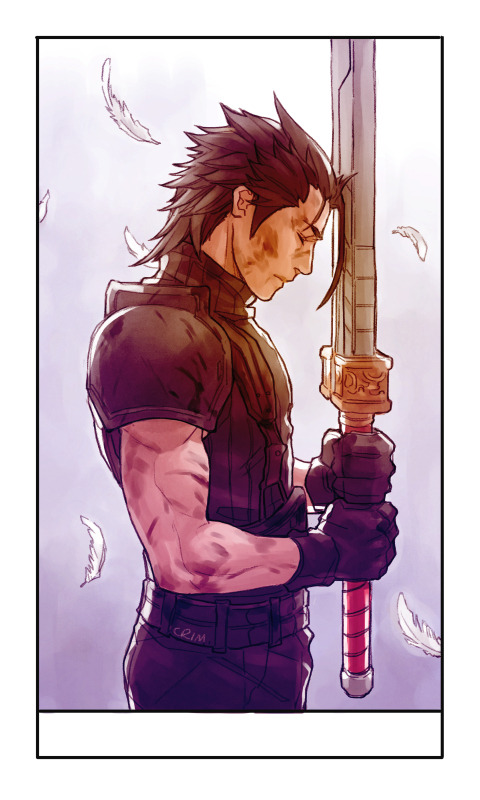
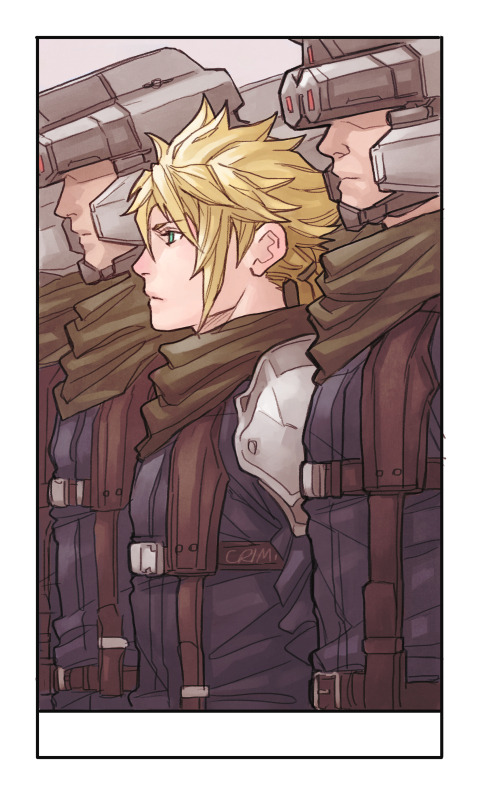
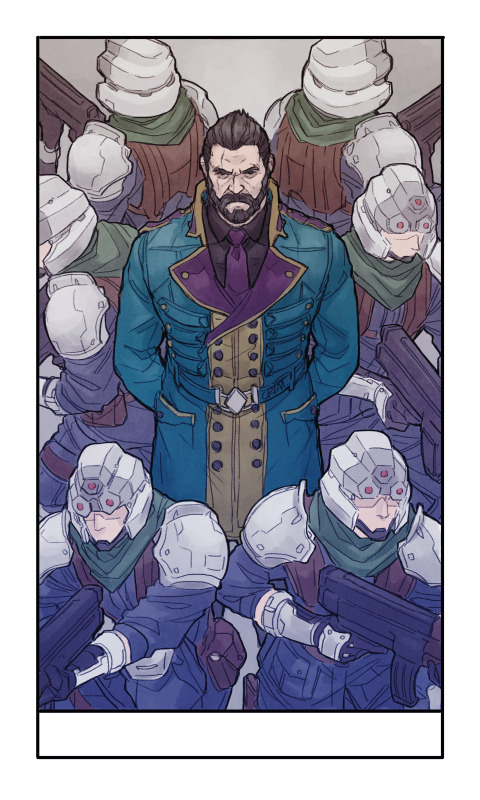
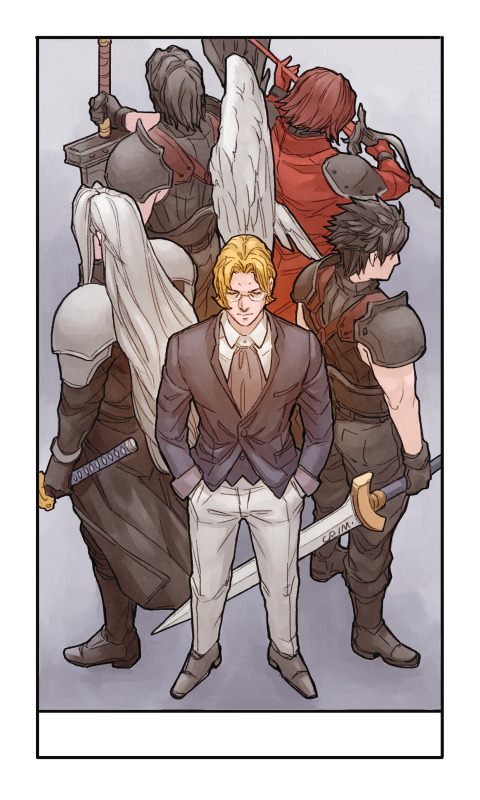
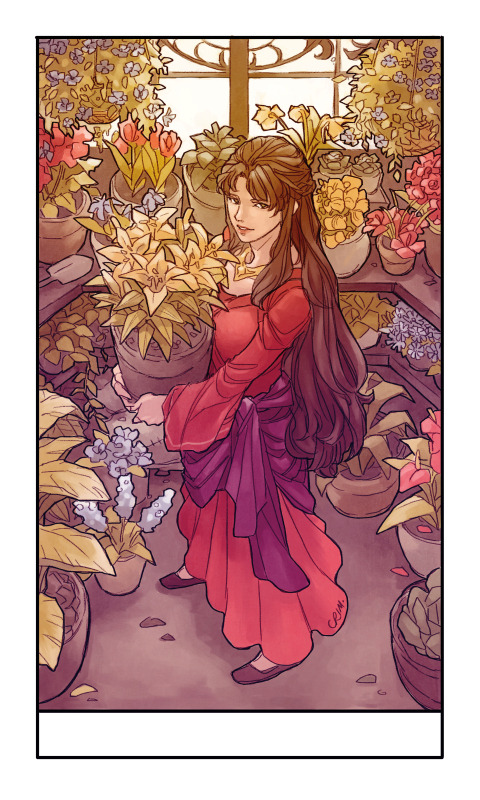
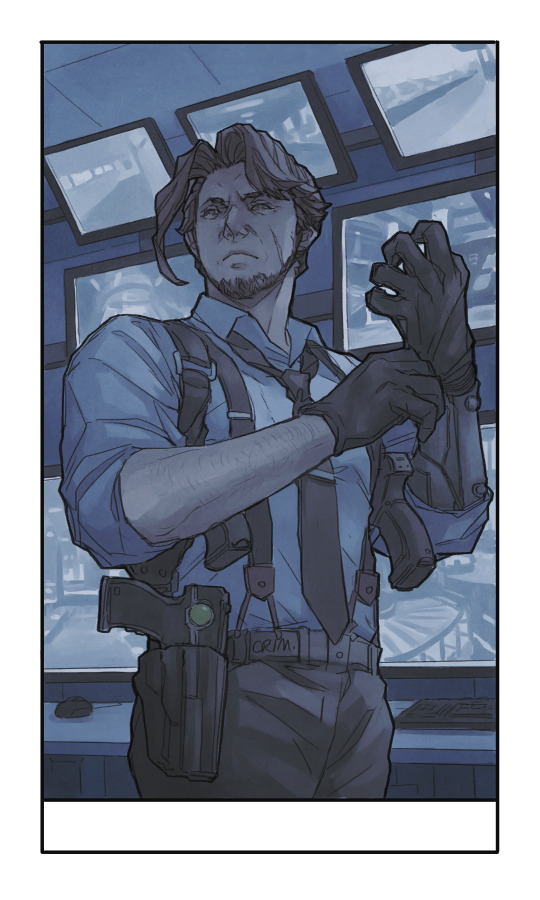
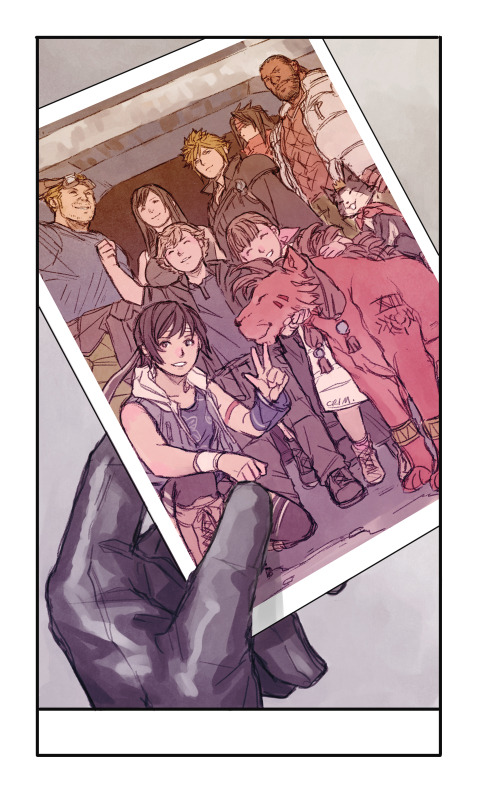
A few more for the FFVII minor arcana.
I often get asked if the deck will be printed, and the answer is yes! The best way to keep updated is on Patreon, where you’ll also get card meanings, WIPs, and monthly prints of the cards and pretty much anything else I’ve drawn, if you so choose. Bonus being you’ll also be helping me pay my bills and ensuring I can keep creating. Please consider joining us over there if you can.
Previously: FF playing cards | FFVII playing cards | FFXV Tarots | FFVII Tarots | FFXV Playing cards
Patreon | Twitter
Tifa’s journey and resolve
As we’ve previously discussed, when Tifa first discovered Cloud at the train station, she found herself faced with a dilemma: she could heedlessly tell Cloud what she knows and risk losing him physically or mentally; or she could build up her resolve and wait for the opportune moment to tell him, hoping that with proper timing, she’d be able to tell him without losing him. Tifa chooses the latter.
Tifa wrestles with her secret across Midgar, Kalm, Gongaga, and Cosmo Canyon, but her worries finally push her over the edge at Gold Saucer’s Ghost Hotel. While Red XIII worries that he may go mad, Tifa is the only one who realizes that this is likely what is happening to Cloud; that Cloud may very well be going mad already. In her fear, Tifa snaps:

Red XIII: Cloud… I’m number 13. Am I going to go mad too?
Tifa: I don’t know what Hojo did to you, but you’ve been all right so far, right?
Red XIII: But…
Tifa: Be strong.
Red XIII: But, I…
Tifa: Stop it, Red XIII! Be strong!
Cloud: Tifa?
Tifa: You’re not the only one who’s worried!
(Source)
This uncharacteristic outburst convinces her. She has to talk to Cloud–and if she can’t find the opportune moment, she’ll make one.
So… she asks Cloud out on a date.
And the opportune moment reveals itself on the gondola:

Tifa: Ok, I’m going to just go ahead and say it…
Cloud: …what?
Tifa: Aeris would be able to just come out and say it, probably. Cloud… Sometimes being old friends is hard. I mean, timing is everything.
Cloud: Yeah…
Tifa: Cloud…? I……
Tifa: ………………….
(Source)
The gondola script looks like an attempted romantic confession–but much like everything else pre-Lifestream, looks can be deceiving. Given Tifa’s earlier emotional outburst, it’s far likelier that her words are hinting at her worries. But regardless of the interpretation, as “Interrupted by Fireworks” swells in the background, Tifa can only think of one thing: “I need to tell him.” Be it her doubts or her affections, could it be that now is finally the right time?
Surrounded by the flash and glitter of the Gold Saucer, Tifa hesitates… and before she knows it, the ride is over. Tifa lacks the confidence and resolve to be open with Cloud, and she allows the opportune moment to slip through her fingers.

Like Tifa said, timing is everything, and she never gets an opportunity like this again. As soon as they get off the gondola, Cait Sith’s actions set off a rapid-fire chain of events that culminates at the Norther Crater.
And suddenly, all of Tifa’s worst fears are realized. She loses Cloud mentally. She loses Cloud physically. He is gone. All of her careful, calculated efforts were for naught. Tifa is left bereft and depressed.
Which brings us to Mideel:

Tifa: What’s the matter? Are you all alone?
(dog whimpers)
Tifa: You got lost didn’t you? Separated from someone you love? Silly thing…
(Source)
This moment is huge for Tifa. This is the first time she is able to articulate, even indirectly, any of the thoughts locked away in her heart. Between Northern Crater and this moment, Tifa has changed.
And just in time. Tifa learns that Cloud may be alive and near. Filled with hope, “Interrupted by Fireworks” swells in the background and harks back to that moment on the gondola, when Tifa could only think of one thing: “I need to tell him.” And this time, Tifa is not going to let the moment slip through her fingers.
Final thoughts:
This makes Cloud’s clone status all the more heartbreaking. Just when Tifa thinks that Cloud is safe and she can finally make up for missed opportunities, Cloud is not ready to hear her. Once again she’s lost her chance and she’s lost Cloud. We all know Remake is going to rip our hearts out with this scene.

Damn this doctor is extra af, way to twist the knife (and explain why Tifa stays with Cloud):

“Timing is everything.” Tifa is right–from Cait Sith’s treachery through to Cloud’s clone violence, Tifa never gets the chance to talk to Cloud in private. By the time Cloud wakes up at the Gongaga Inn, his ego is at the brink of collapsing into full Sephiroth Copy mode–and if he got even a hint that Tifa doubts him, his ego would simply collapse sooner, same as it does later at Northern Crater. Tifa senses this, and hopes that fake confidence in Cloud will tide him over. This is also why she asks to stay in the party when the group goes to take on Sephiroth–she wants to keep an eye on him and support him, not just “settle things with Sephiroth.”
“Timing is everything,” reemphasized. Through the Lifestream sequence, we realize that even if Tifa had opened up to Cloud earlier, nothing would have changed–Cloud wasn’t ready to face his own flaws and work resolutely towards the truth with no reservations. The right time really is after Northern Crater and in the Lifestream.
In an upcoming (mostly written!) post I’ll talk more about how “Interrupted by Fireworks” is actually a clever device to subvert our expectations… for both girls. There’s a lot of interesting symmetry that makes the divergences even more striking.
Special shoutout to @janeiteoftheslums who pointed out a detail I missed in the first (extremely short-lived!!) version of this post. Thank you so much! Everyone, if you’re craving some cloti goodness, head on over and read some of her fics.



Next big project is a calendar for 2020, starring FF characters from VI to XV, flowers, and wings. First up, these lovely ladies from VII.
As always, the project is funded by Patreon. Do have a gander over there for this, and other goodies, if you’d like to help us out!
The new tag will be FF Calendar Project.
Patreon | Facebook | Twitter
There's quite an interesting tendency in the various "analysis" of this character. On the one side she's accused to lack a character arc because it's too interwoven with Cloud's - which is enough of a weird accuse, as if she, of all characters, was expected to have a life disjointed from sociality..? Isn't every person the product of their social experiences and relationships with other human beings? How comes nobody accuses Vincent to lack a character arc because it revolves around Lucrecia? - while on the other hand she's harshly accused to be a regrettable character because she's too busy trying to overcome her personal issues to tell immediately Cloud her version of Nibelheim incident, or because she scolded him during AC - as if all of this happened for no reason.
So either she lacks a character arc and she's completely devoted to Cloud, or she has one and Cloud is not her only concern, people should pick one or just stop "analyzing" characters in purposeful bad faith, to push the idea that if Aerith could have been in that situation instead of her things would have been better, which is wrong by all means, but still it is a groundless comparison with the only purpose to trick the interlocutor and reach the consensus that this character is bad/shallow/uninteresting/unworthy, so by default the other one must be "the good one" aka the winner of "the competition".
If she's constantly portrayed in every single entry of the story by Cloud's side, then Cloud is involved in her life just like she's involved in his. Hell, Cloud devoted his youth trying to be worth her attention, and later created a fake persona based on her perception of him, to cope with the sense of guilt for failing to save her twice. HE revolves around her.
It's pointless to try to describe her as a sort of annoying insect that stubbornly keeps flying around him. It's a matter of common sense.
Seriously, nothing ruins this story and its characters for me more than these bad takes.
As a Cloti, what do you think about the criticism of OG FF7 where Tifa revolves around Cloud too much?
I think people need to get over the fact Tifa's story entwines with Cloud's because she's the deuteragonist and her role is to support the protagonist.
Wutai: etymologies and possible real-life references
As suggested by my profile pic, Remake Yuffie stole my heart. The DLC made a great job introducing her and giving her deep characterization and motivations for the following parts of the story. I have no doubt Wutai is going to be great, and I had a lot of fun trying to find the possible sources behind the creation of Yuffie's homeland, anyway, I'm not a sinologist nor an expert of eastern religions, so everything in this post has to be taken with a grain of salt.
The following post has been inspired by this post by@allsortsoflicorice and the following TLS thread (thanks!).
-
Wutai (ウータイ) is an island state in the far west of the FFVII world map. It had always been a proud and powerful nation, and when Shinra Electic Power Company menaced to establish its economical domain with the installment of Mako reactors on its soil, the nation wadged a war that lasted several years. In 0001, after the capture of Fort Tamblin, Wutai's leader Godo Kisaragi finally surrendered to Shinra and Wutai became a mere touristic attraction, even if resistance cells continued their work and became affiliated with Avalanche.

The village stands at the base of a mountain, immersed in a wide forest and crossed by a river. The architecture of the buildings is inspired by real-life far East style and there's a big statue of a local deity carved on the side of the mountain facing the village.

Wutai is the homeland of Yuffie Kisaragi. In the original FFVII, since Yuffie was an optional character, also Wutai was an optional and perfectly skippable location, nonetheless many cultural references were mixed to create this beautiful place.
Moreover, I think we can expect Remake Wutai to have a more influent role in the FFVII universe, since the shape of a pagoda already appeared in Aerith's mural painting, between Cosmo Canyon and the Cetras.

Final Fantasy games are well known to be based on a heterogeneus mix of cultural influences, from Polytheistic to Monotheistic religions and myths, up until Eastern religions and phylosophies that are especially prominent in Wutai.
One of the main themes of FFVII is the cycle of life, symbolized by the Lifestream as both the physical and metaphysical place where souls merge together and allow the rebirth of new life forms in a neverending cycle. This theme is reminiscent of the concept of Saṃsāra, originated in India and then exported to the far East lands through Buddhism (e.g. Melphie's pinwheel hair-clip could symbolize this theme).
Buddhim in particoular seems to have been a great source of inspiration for the creation of this amazing location.
-
Wutai is the real toponym of a Chinese holy mountain, referring to its uncommon shape and it is one of the four sacred mountains in Chinese Buddhism (and Taoism). Interestingly enough there's an old legend about this mountain that involves the King of Dragons.
To provide context, dragons are sacred creature in Eastern folklore. Most of oriental dragons stem from the Chinese version, called Long, traditionally depicted as a snake-like creature with four legs and/or wings. Unlike their western counterparts, Longs are benevolent beings, associated with power, good luck, fertility and rain. They use to dwell in rivers, lakes, seas, they roam the skies and control weather ("Raya and the last dragon" provides good and simple examples of this folkloristic creatures and their legendary powers).
It's not farfetched to see the nod between the Dragon King and the presence in FFVII Wutai of Leviathan, a dragon-like summon that could be achieved in the OG after completing the Pagoda side quest, and that serves as Wutai guard water-deity.
Leviathan was introduced for the first time in the franchise in Final Fantasy II as a monster, while with Final Fantasy III it became a recurrent Summon associated to water, often known as "Sea King" or "Lord of all Waters". The name comes from the homonymous demoniac creature, a fearsome evil sea serpent of the Middle Eastern mythology that symbolizes chaos. FFVII Leviathan preservs just the name of this biblical reference but embodies perfectly the iconography and symbolism of Chinese Longs. Indeed the village is built on a big river.


(from the Fort Tamblin section of Crisis Core: Leviathan fountain on the left, and Wutais banners, depicting a serpentine creature wrapped around a sword, on the right)
As we said before, there's a huge sculpture carved in the side of the mountain facing the town, called "Da-Chao statue", a water deity.

It's hard to establish the real etymology of its name, since it's written in katakana (ダチャオ), but it could come from the chinese

This word exists also in Japanese (pronounced oosho) and it could be roughly translated also as "big tide" (spring tide is a phenomenon occurring twice a month during full moon and new moon, when Earth, Sun and Moon are aligned, affecting tide's range that reaches its maximum). Worth noting that Leviathan can perform "Tidal Wave".
The statue is also formed by four figures. It could be a loose reference to the myth of the Dragon Kings of the Four Seas: during a period of drought the four dragon managed to make it rain without the permission of the Jade Emperor, so he punished them imprisoning them all under a mountain, where the dragons decided to turn themselves in rivers.
The group has to use the "Scales of the Sea God" (or Leviathan scales) to extinguish the fire in the cave on Da-Chao mountain, and the item can only be found in Junon underwater reactor, which could refer to the legendary Dragon King that lived in an underwater palace.
Alternatively, since the central statue has four arms (six in the pagoda version), it could be a refernce to a Buddhist guard deity called Mahakala (derived from the Hindu Shiva). Notably, this deity is associated - at least in China - with sexuality and fertility, and Don Corneo made his last despicable attempt to choose a girl between Elena and Yuffie on this statue.

From Ultimania Omega: in the guest room there's a painting representing four Buddhist figures and a six-arm deity in the middle.
Among the enemies that can be found on Mount Da-Chao, there's Garuda (ガルーダ) a Hindu and Buddhist creature, while in Crisis Core there's another set of recurrent enemies called "Vajradhara", related to Buddhism as well, while the Wutaian organization "Crescent Unit" could refer to the lunar phases and so be linked to the aforementioned meaning of Da-Chao.
-
During the pagoda side quest, after which the the group receives Leviathan summon materia, Yuffie is forced to fight five warriors, one for each stage of the building.
The names of these fighters probably come from the names of western playwrights, with the ecception of Yuffie's father, whose name is anyway related to theatre:
Gorkii -> Maxim Gorky
Shake -> William Shakespeare
Chekhov -> Anton Chekhov
Staniv -> Constantin Stanislavsky
Godo -> Godot
In Japanese, each one of them has a different way of speaking.
This odd relation with theatre could be explained by the fact that the chinese word "wutai" (same tones) can be written in two different ways:

The word 舞台 (butai) in Japanese specifically means "theatre stage" or "theatre setting".
The inspiration for this part of the game could be the traditional Japanese Noh theatre. Usually Noh plays are composed of five standalone pieces selected from five different categories, and many of the plays include shapeshifting creatures.
As stated before, Godo is the only fighter whose name is not that of a playwright but a fictional character, Godot. It could be linked to the fact that the word ゴドー in Japanese is homophone to 悟道, a Buddhist term referring to the path to the enlightment.
As a boss, Godo becomes a monster that, in my opinion, is a reference to Asuras, Hindu demigods with three faces and four arms that appear also in Buddhism. In the latter, it is traditionally told that Asuras were dismissed by the heavenly world they shared with gods, which could be a loose reference to Wutai losing the war (in this case "Godo" could be linked also to the English "God").

-
Finally: Yuffie Kisaragi.
Yuffie is not a real name, especially not a Japanese one since the sound fi doesn't exist in that language. The only real-life connection I could find is a very similar Chinese female name, Yufei 雨霏, whose meaning is something like "happy even though it rains", which fits her personality.
Kisaragi is often mistankenly translated as February but in reality 如月 was the old name for the second month of the Japanese lunar calendar that, traditionally, marked the beginning of spring.
I'm totally clueless about the meanings of Melphie and Sonon's names.
-
Sadly I haven't found any hint about what could be the origin of Da-Chao beans, nor any further reason behind the name of "Fort Tamblin" (タンブリン->tambourine).
If anybody has suggestions or corrections they'll be very well appreciated!



